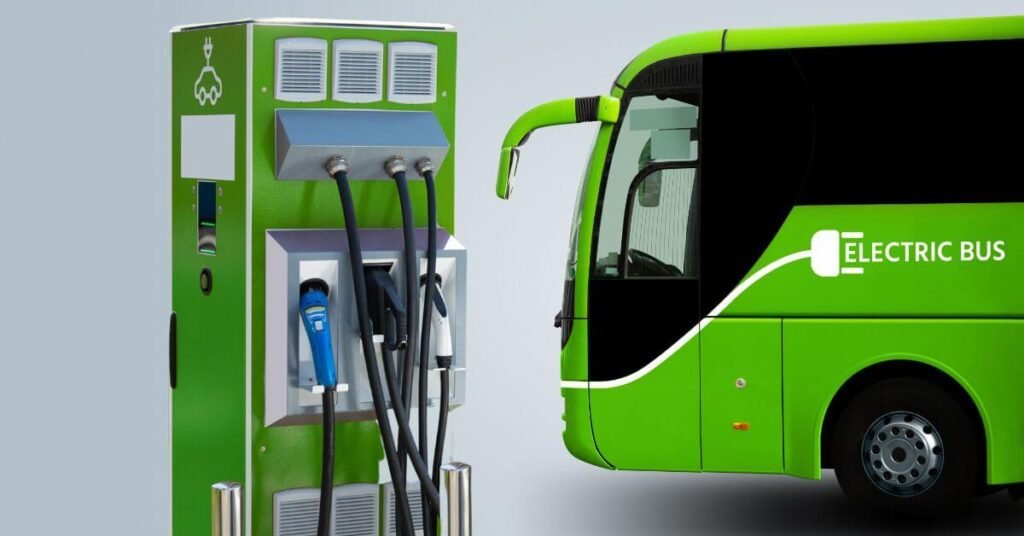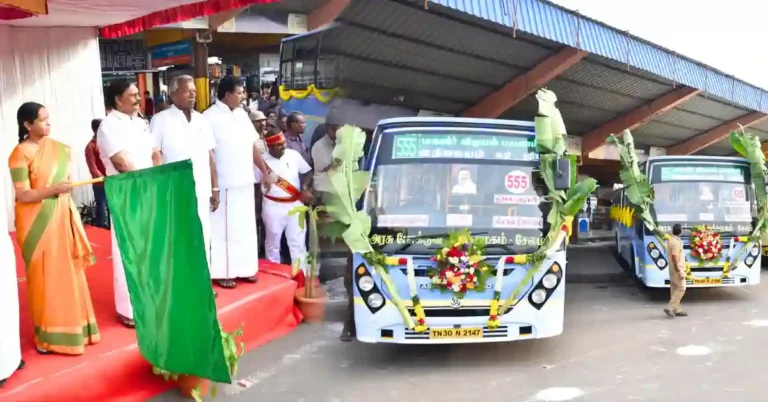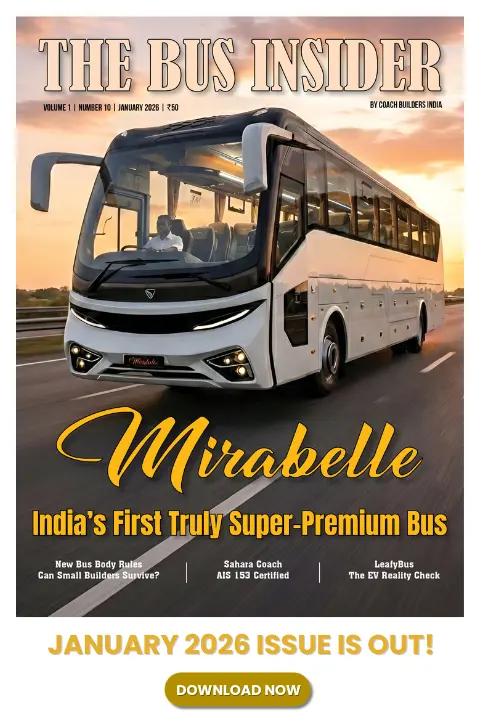MP Electric Vehicle Policy 2025: A Big Push for Electric Buses & Public Transport
The MP EV Policy for Buses 2025 is set to drive the adoption of electric buses, enhance infrastructure, and boost local manufacturing, shaping a sustainable future for public transport in Madhya Pradesh.

The MP Electric Vehicle Policy 2025 is a strategic initiative by the Government of Madhya Pradesh (GoMP) to accelerate the transition to electric mobility. While the policy focuses on all EV segments, it has significant implications for the bus industry, including public and private transport operators.
With growing urbanization and increasing demand for sustainable transport, the policy aims to expand e-bus fleets, strengthen charging infrastructure, and incentivize local bus manufacturing. These measures are set to reduce operational costs for operators, promote eco-friendly transit, and improve passenger accessibility across the state.
Also Read: Indore to Get the Highest Number of Electric Buses Under PM e-Bus Seva Yojana
Vision & Objectives
The MP Electric Vehicle Policy 2025 aims to:
- Make EVs the preferred mode of transportation, especially in public transport
- Develop accessible and efficient EV charging infrastructure
- Support local manufacturing of e-buses, components, and batteries
- Generate employment opportunities in the EV and public transport sector
- Encourage government-private partnerships for fleet electrification
Key Highlights of MP Electric Vehicle Policy 2025
Electric Bus Adoption Targets
The policy outlines clear e-bus adoption goals, with a major focus on fleet electrification for public and private transport operators.
| Category | Target (% of New Registrations by 2030) |
|---|---|
| Government Buses | 100% |
| Private Fleet Buses | 40% |
The 100% e-bus adoption target for government fleets is expected to drive significant procurement opportunities for manufacturers and leasing firms.
Financial Incentives for E-Buses
To encourage e-bus adoption, the policy provides direct financial subsidies:
| Bus Type | Subsidy per Bus | Total Units Eligible |
|---|---|---|
| Electric City Buses | ₹10 lakh | 100 |
| Intercity E-Buses | ₹12 lakh | 50 |
| E-Bus Retrofitting | ₹6 lakh | 75 |
Additional Benefits:
- 100% exemption on road tax and registration fees for e-buses
- Interest subvention for fleet operators financing e-bus purchases
- Special financing support for private intercity bus operators
Charging Infrastructure Expansion
A key component of the MP New EV Policy is the large-scale deployment of charging and battery-swapping stations to ensure seamless operations for e-bus fleets.
Charging Infrastructure Targets
| Infrastructure Type | Coverage |
|---|---|
| Charging station every 1 km² | In model EV cities (Bhopal, Indore, Jabalpur, Gwalior, Ujjain) |
| One Public Charging Station (PCS) every 20 km | On major highways and roads |
| Fast-charging stations every 100 km | For long-distance e-buses |
| Mandatory EV charging in all new commercial depots | Across cities and towns |
Policy Incentives for Charging:
- Leasing of government land at ₹1/kWh revenue-sharing model for public charging stations
- Subsidy of ₹5 lakh for the first 100 battery-swapping stations, catering primarily to commercial fleets
- Integration of EV charging at all petrol pumps, ensuring easy access for intercity e-buses
Support for E-Bus Manufacturing & Retrofitting
To make Madhya Pradesh a hub for electric bus manufacturing, the policy extends capital subsidies and incentives to bus manufacturers, battery makers, and retrofitting firms.
Manufacturing Incentives
| Industry Category | Capital Subsidy | Max Units Eligible |
|---|---|---|
| Small Manufacturers | 20% (Up to ₹40 lakh) | 10 Units |
| Medium Manufacturers | 20% (Up to ₹50 lakh) | 5 Units |
| Large Bus OEMs | 10% (Up to ₹10 Cr) | 3 Units |
Other Key Initiatives:
- Employment subsidies of ₹40,000 per worker annually for 5 years for EV manufacturing jobs
- SGST reimbursement for up to 7 years for large e-bus manufacturers
- Dedicated industrial land banks for setting up EV manufacturing plants
Battery Recycling & Sustainable Fleet Management
The policy also prioritizes battery recycling and refurbishment to ensure cost-effective, long-term operations for bus operators.
- Incentives for setting up battery recycling plants
- Online registry for battery recyclers to ensure compliance with disposal norms
- Retrofitting incentives for converting existing diesel buses into electric buses
Skill Development & Job Creation in E-Bus Sector
To address the growing demand for skilled EV professionals, the policy promotes training programs for e-bus maintenance and fleet management.
| Initiative | Details |
|---|---|
| Vocational Training for EV Mechanics | Under Mukhya Mantri Seekho Kamao Yojana |
| Tie-ups with ITIs & Engineering Colleges | Focused on EV diagnostics, repair & maintenance |
| Private Partnerships for Workforce Training | Collaborations with bus manufacturers & fleet operators |
Government’s Role in E-Bus Transformation
To ensure smooth policy implementation, the government has announced key measures:
- 80% electrification of all government buses by the end of the policy period
- Formation of the Madhya Pradesh EV Promotion Board (MP-EVPB) for policy execution
- Development of Bhopal, Indore, Jabalpur, Gwalior, and Ujjain as EV model cities, featuring Green Zones and E-Mobility Corridors
Also Read: Electric Double-Decker Bus in Indore to Start Service Soon
Boost for R&D & Innovation
To encourage research in EV technology, the policy provides:
| Initiative | Funding Support |
|---|---|
| Grants for EV R&D Centers | Up to ₹2 crore |
| Testing Equipment Procurement | Special funding for innovation |
Implementation & Funding
The Madhya Pradesh Electric Vehicle Promotion Board (MP-EVPB) will oversee policy execution. The funding sources include:
| Funding Source | Purpose |
|---|---|
| Air Quality Cess (₹0.10 per liter on diesel) | EV incentives & awareness campaigns |
| Luxury Vehicle Tax (on diesel/petrol vehicles ₹25 lakh+) | Charging infrastructure expansion |
| Municipal Green Bonds | Funding EV transit projects |
The MP Electric Vehicle Policy 2025 is a game-changer in transforming Madhya Pradesh into a sustainable mobility hub. By incentivizing consumers, businesses, and manufacturers, the state is paving the way for a greener, cleaner, and economically viable future.
Catch the latest Bus Industry updates, Exclusive Interviews, Bus News, and International Bus News on Coach Builders India. Download the latest issue of the The Bus Insider magazine for more insights.






